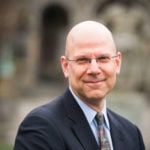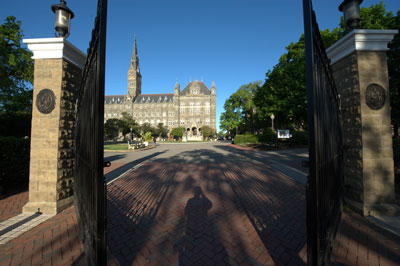Leaders in Higher Education
THIS GUIDE IS NO LONGER ACTIVE. For the current FP Guide, click here.
Joel S. Hellman, Dean
Georgetown University, Walsh School of Foreign Service
U.S. international relations and the global order are undergoing a period of tremendous change, and Joel S. Hellman, dean of Georgetown University’s Walsh School of Foreign Service (SFS), sees that as an opportunity for his school and its students.
“It shakes us up, it shows us how consequential these issues are, and it spurs deeper investigation,” says Hellman. “We’ve seen increases in our application rates and enrollment because students are fired up about strengthening their skills and getting involved, despite the difficult questions.”
The timing holds a particular relevance for SFS, he adds. “We’re coming up on our 100th anniversary in 2019. When the school was established in 1919, we were re-imagining the world global order after World War I. Now, similar kinds of global issues are being actively debated again.”

“The range of opportunities for our graduates is much wider than ever—and it’s growing, especially in the private sector.” –Joel S. Hellman, Dean, Walsh School of Foreign Service, Georgetown University
And SFS is in the thick of the action, thanks to its location in the heart of Washington, D.C. Students are exposed to a regular flow of world leaders, cabinet members, diplomats, and other top-level officials. With the U.S. government’s change in administration, a larger-than-usual number of officials have left positions in international affairs and have come to teach and lecture at SFS.
For students who may worry that recent changes in U.S. foreign policy could limit their career opportunities, Hellman offers reassurance: “The range of opportunities for our graduates is much wider than ever—and it’s growing, especially in the private sector.”
 As more and more companies establish a global presence and need to integrate global issues into their strategy, they are showing greater interest in SFS students and their skills. In particular, Hellman observes high demand in the fields of security, defense, technology, multilateral development, and foreign investment. “There hasn’t been any big dip in our students’ ability to get jobs,” he says. “In fact, we’re adding more sectors.”
As more and more companies establish a global presence and need to integrate global issues into their strategy, they are showing greater interest in SFS students and their skills. In particular, Hellman observes high demand in the fields of security, defense, technology, multilateral development, and foreign investment. “There hasn’t been any big dip in our students’ ability to get jobs,” he says. “In fact, we’re adding more sectors.”
Now in his third year as dean, Hellman points to increased flexibility in the school’s eight graduate programs: MS in Foreign Service (MSFS), MA in Security Studies, Master of Global Human Development, and five regional MA programs. “While the programs allow students to delve deep into issues they are passionate about, we are also creating opportunities for students to cross boundaries to combine disciplines and themes that are a link to current issues,” he says.
Hellman is unabashedly proud of the shout-out the school recently received in a New Yorker review of the hit television series Star Trek Discovery. He says the reviewer described the starship crew’s earnestness and drive as if everyone “had made Eagle Scout, then graduated from Georgetown’s School of Foreign Service, before accelerating to warp ten.”
Hellman notes with a laugh that it’s only a TV show, but he still takes the compliment seriously. “I was very pleased to have SFS be seen as a cultural signifier for smart and wholesome in this world—and the universe.”
Graduate Degree Program Options:
• Master of Science in Foreign Service (MSFS)
• MA in Security Studies
• Master of Global Human Development
• MA in Arab Studies
• MA in Asian Studies
• MA in Eurasian, Russian and East European Studies
• MA in German and European Studies
• MA in Latin American Studies
• MA in International Business and Policy
Visit the Request Info page to receive information from the schools.
Contents
- Leaders in Higher Education
- Johns Hopkins School of Advanced International Studies (SAIS)
- Georgetown University, Walsh School of Foreign Service
- Stanford University, Freeman Spogli Institute for International Studies
- Texas A&M University, Bush School of Government and Public Service
- New York University School of Professional Studies, Center for Global Affairs
- UC San Diego, School of Global Policy and Strategy
- University of Denver, Josef Korbel School of International Studies
- University of Washington, Henry M. Jackson School of International Studies
- Arizona State University, Center on the Future of War
- Georgetown University School of Continuing Studies
- Syracuse University, Maxwell School of Citizenship and Public Affairs; and Center for Strategic and International Studies
- University of Kent, Brussels School of International Studies
- Sciences Po, Paris School of International Affairs
- Columbia University, School of International and Public Affairs (SIPA)
- The Fletcher School of Law and Diplomacy at Tufts University
- University of Notre Dame, Keough School of Global Affairs
- Arizona State University, Thunderbird School of Global Management

